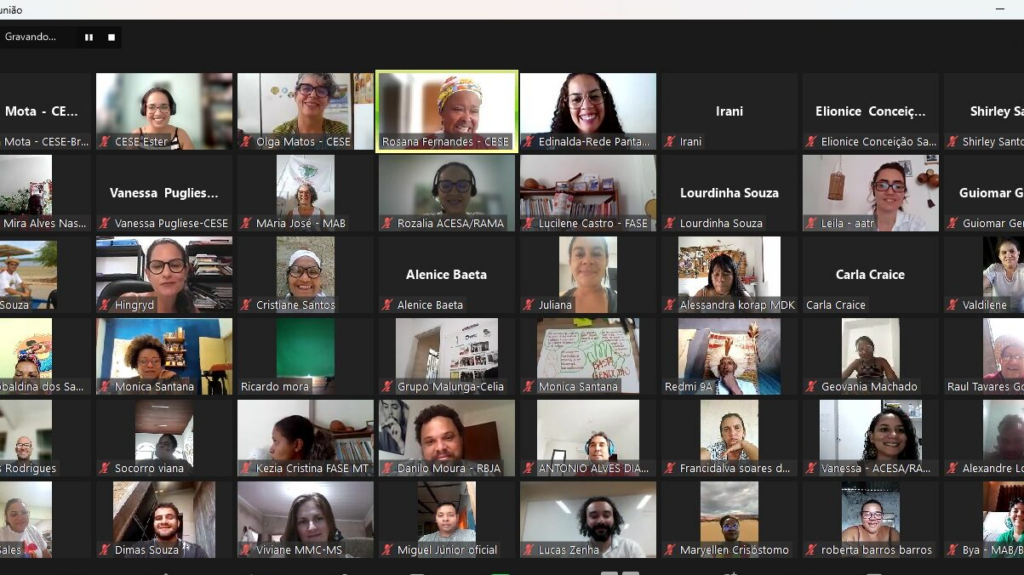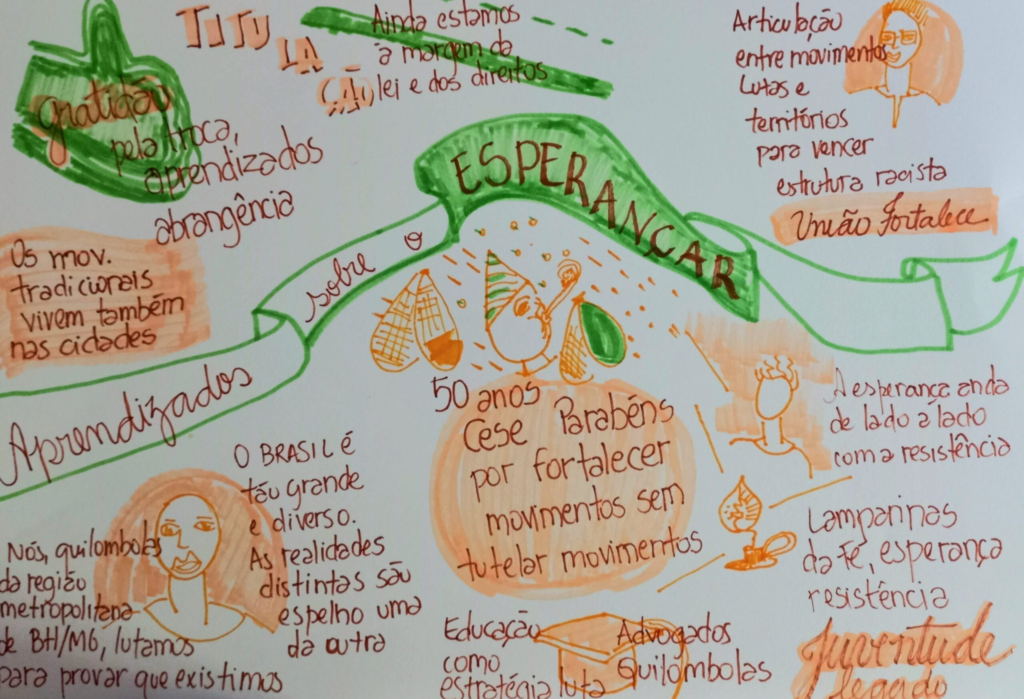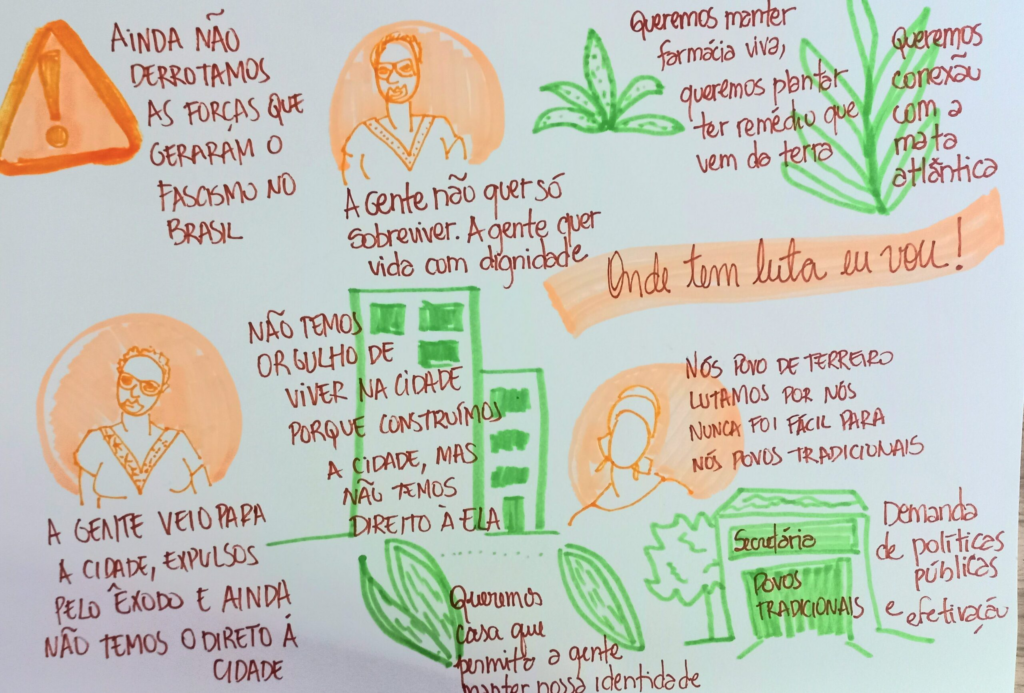
After four years of systematic attacks on democracy and the Rule of Law, social movements and organized civil society faced 2023 with renewed hope, despite the countless challenges they confront. Prompted by this urgency, on 1 and 2 March, CESE hosted an “Online Seminar – the Hope of Traditional Peoples and Communities,” encouraging dialogue between indigenous and quilombola leaders, leaders of fishing communities, women’s movements, pasture and grazer communities and others.
With representatives from 21 Brazilian states, the meeting reflected a plurality of Brazilian contexts, looking at complex socio-environmental, political, racial, gender and generational issues, including the fight for land.
The event was supported by MISEREOR and opened commemorations of 50 years of CESE’s uninterrupted work in the defence of human rights and democracy. The seminar provided reflections about the need for links between social movements and traditional communities, carrying on with the struggle and the political agenda, and confronting fascism, which still hangs over Brazilian society.
CESE’s Executive Director, Pastor Sônia Mota, recalled how the organization was born at a time of a resurgence in the dictatorship and political persecution. “This moment is one to renew union and integration as strategies to confront difficult times. A lot of listening will be required, a lot of exchange and cooperation, so that we can keep life and hope alive,” she declared.
Political situation – Based on an understanding that the defence of democracy unites the diverse movements and traditional communities who participated in the event, the seminar included a moment to construct an analysis of the current situation, with Ceres Hadisch from the National Coordination of the Landless Rural Workers’ Movement (Movimento Sem Terra: MST), Edinalda Pereira do Nascimento from the Network of Traditional Pantanal Communities (Rede de Comunidades Tradicionais Pantaneira), Maryellen Crisóstomo from the National Coordination for the Coalition of Black Rural Quilombola Communities (Coordenação Nacional de Articulação das Comunidades Negras Rurais Quilombolas: CONAQ) and Alessandra Munduruku from the Pariri Indigenous Association (Associação Indígena Pariri) and the Federation of Indigenous Peoples from Pará (Federação dos Povos Indígenas do Pará: FEPIPA).
Hope represents an ongoing movement for traditional communities, not passive hope, but hope produced in action and in the struggles of resistance. “The Brazilian people have confronted defeats and great setbacks, coupled with the impacts of the pandemic, which has left us scarred and in pain. We have experienced gigantic offensives in the midst of a global crisis in capitalism which has put democracy into crisis. When we fight for democracy it is connected to staying alive. The incontestable fight for democracy is about the defence of life,” Ceres Hadisch asserted.


Alessandra Munduruku talked about how her people have resisted in order to preserve their sacred places and their companions from big business projects involving mining, hydroelectric dams, waterways, and other large-scale works that impact on the Tapajós River. “Who is going to consult the animals? Who is going to consult the sacred places? Will the government consider this? Do they know where the fishes live? Do they consult and listen to the children? Will you, who come from outside, consult and stay with us in the forest to really get to know it? You want to teach us how to live, but we have our own consultation protocols for our entire people, for all of us and for nature,” she declared, reinforcing the self-determination of her people and their capacity to make decisions about their own territory.
Érica Monteiro, member of CONAQ and the State Coordination Office for the Associations of Quilombo Remnant Communities of Pará (Coordenação Estadual das Associações das Comunidades Remanescentes de Quilombo do Pará: MALUNGU); Braulina Baniwa, indigenous anthropologist, Co-founder and Executive Director of the National Coalition of Ancestral Indigenous Warrior Women (Articulação Nacional das Mulheres Indígenas Guerreiras da Ancestralidade: ANMIGA); Elionice Conceição Sacramento, quilombola fisherwoman from Raça de Filomena and member of the Fisherwomen’s Coalition (Articulação das Mulheres Pescadoras); as well as Mira Alves, State Coordinator of the Homeless Movement of Bahia (Movimento Sem Teto da Bahia: MSTB) and anthropologist Danilo Moura, member of the Brazilian Network for Environmental Justice (Rede Brasileira de Justiça Ambiental: RBJA) were all invited to share their strategies for the defence of the rights of their territories.
“Even given the progress we’ve made, the political situation is not favourable. We’re not riding on a good tide of hope and resistance, however great the election victory. For example, our president hasn’t signalled a commitment to agrarian reform, he hasn’t talked about fishermen and women, he hasn’t talked about structural issues. We need to make our own self-demarcations of our territories. We need to self-demarcate our territories ourselves, because other interests are focused on them,” said Elionice Conceição Sacramento, quilombola and Doctor of Anthropology. She criticized the development model adopted by the Brazilian left, whose choices and decisions ignore traditional communities and racialized groups, let alone its failure to consider socio-environmental impacts. “To have hope in this political situation, we need to look at the experience of our ancestors,” she added.
“We need to retake what has been lost in terms of social participation, but above all to progress, because many of our historical demands for social participation have never been met: the self-determination of the peoples, the people’s control over their territories, the repeal and creation of laws by popular referendum, the repeal of mandates by popular decision. None of this has even been considered,” said Danilo Moura. He believes it is necessary to demand a review of the legacy left by the governments of Michel Temer and Jair Bolsonaro, which weakened democracy and rights.
The wealth of discussion and different points of view was emphasized by the participants who appreciated the depth of the debate and the multiplicity of perspectives. “I would like to congratulate CESE for the event: when I saw the seminar publicity, I could identify with it, because we who are quilombolas spend our lives thinking about hope. And through this seminar, I understood that hope is a movement” said Vera Quilombola from Flores do Dionísio in Mato Grosso do Sul.
“My words are intended to congratulate CESE for its 50 years and thank CESE for the work it does, which supports family farming and agroecology movements and networks, leading to the strengthening of many activities,” added Rosália, from the Maranhão Agroecology Network (Rede de Agroecologia do Maranhão). The event enabled exchanges of experiences between traditional communities, observing their specificities, but also their common challenges and the strategies they have adopted to confront them, both within their territories and in their relationships with governments. “Hope walks hand in hand with resistance. If we have hope it is because we have fought and resisted,” concluded Beatriz Silva, a young woman from the Movement of People Affected by Dams (Movimento dos Atingidos por Barragens: MAB).

